
Television Review | Tales of the Empire
Producers: Lucasfilm
Released: May 4, 2024
Episodes: 6
MPAA Rating: TV-PG
EE Critic Score: 7/10
Tales of the Empire is a six-part anthology of animated short films, done in the style (and by many of the same people) as The Clone Wars. It is the second such "Tales of..." anthology, following last year's Tales of the Jedi. Three of the episodes give the origins of Morgan Elsbeth, one of the key antagonists of Ahsoka Season 1, showing her experience surviving the Separatist massacre of Dathomir and her involvement with the Empire and Admiral Thrawn. The other three pick up on the loose thread of Barriss Offee, a fallen Jedi last seen involved in the plot that saw Ahsoka Tano leave the Jedi Order, as she's given a new chance at freedom from prison as an Imperial Inquisitor. All six episodes were released simultaneously, on May the Fourth, 2024, on Disney+.
(This should not be confused with the 1997 short story collection Tales from the Empire.)
Synopsis
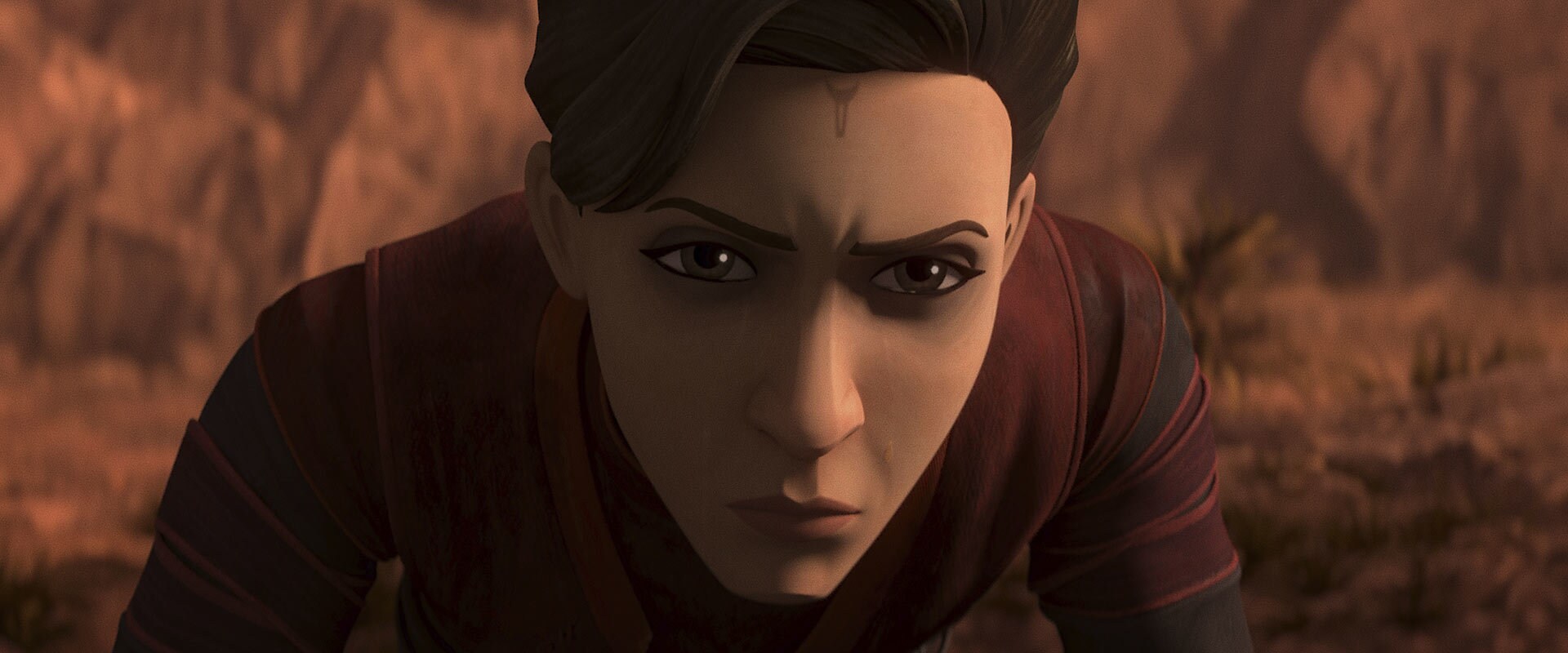
"The Path of Fear"
As General Grievous leads the attack on the Nightsisters of Dathomir, young Morgan Elsbeth sees her mother fall to his blade. She herself survives the attack, and is taken in by the peaceful, secretive Mountain Clan, a group of Dathomir witches separate from the Nightsisters. She argues that the Mountain Clan should arm themselves with Nightsister weapons, attracting several other young women to her cause. When they go to retrieve the weapons, they are spotted by the droid army. One of the young Mountain Clanswomen dies in the ensuing attack before the Mountain Clan's Matron comes to their rescue. The Matron banishes Elsbeth from the mountains, knowing she would only continue to bring war to their people.
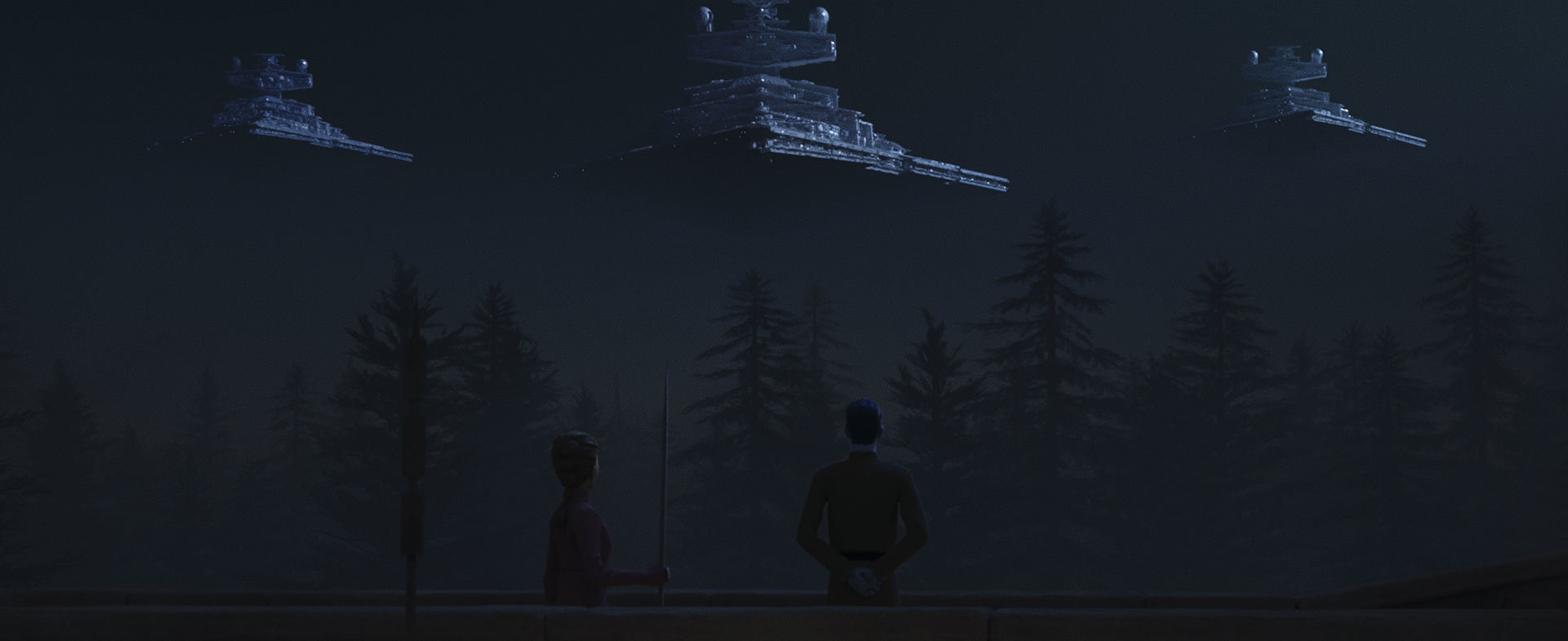
"The Path of Anger"
Morgan Elsbeth has now become an industrialist supplying the Imperial military. She presents a proposal for an improved TIE fighter; she is initially turned down by Imperial delegates, but Captain Gilad Pellaeon takes note of her. Later, she is attacked by the Noghri assassin Ruhk. She fights him off, and Admiral Thrawn reveals himself, declaring Elsbeth worthy to join his inner circle. He offers his favor to her new TIE fighter design, and part of his fleet to keep her in power on Corvus.
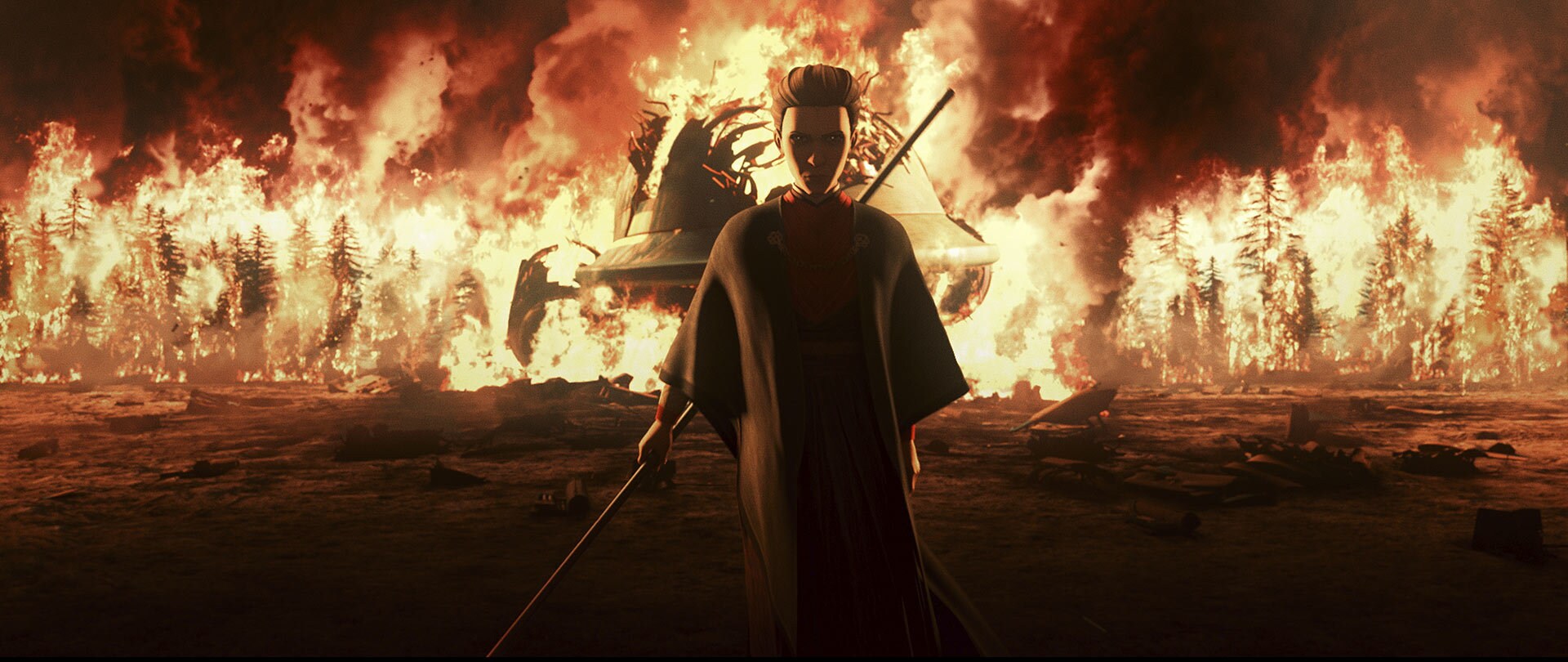
"The Path of Hate"
After the fall of the Empire, the New Republic sends Nadura, a former resident of Corvus, to arrest Elsbeth. Elsbeth's droids kill Nadura's guards, destroy her ship, kill Nadura herself in the blast, and burn the forest surrounding the city. The Empire may be gone, but Elsbeth isn't giving up Corvus.
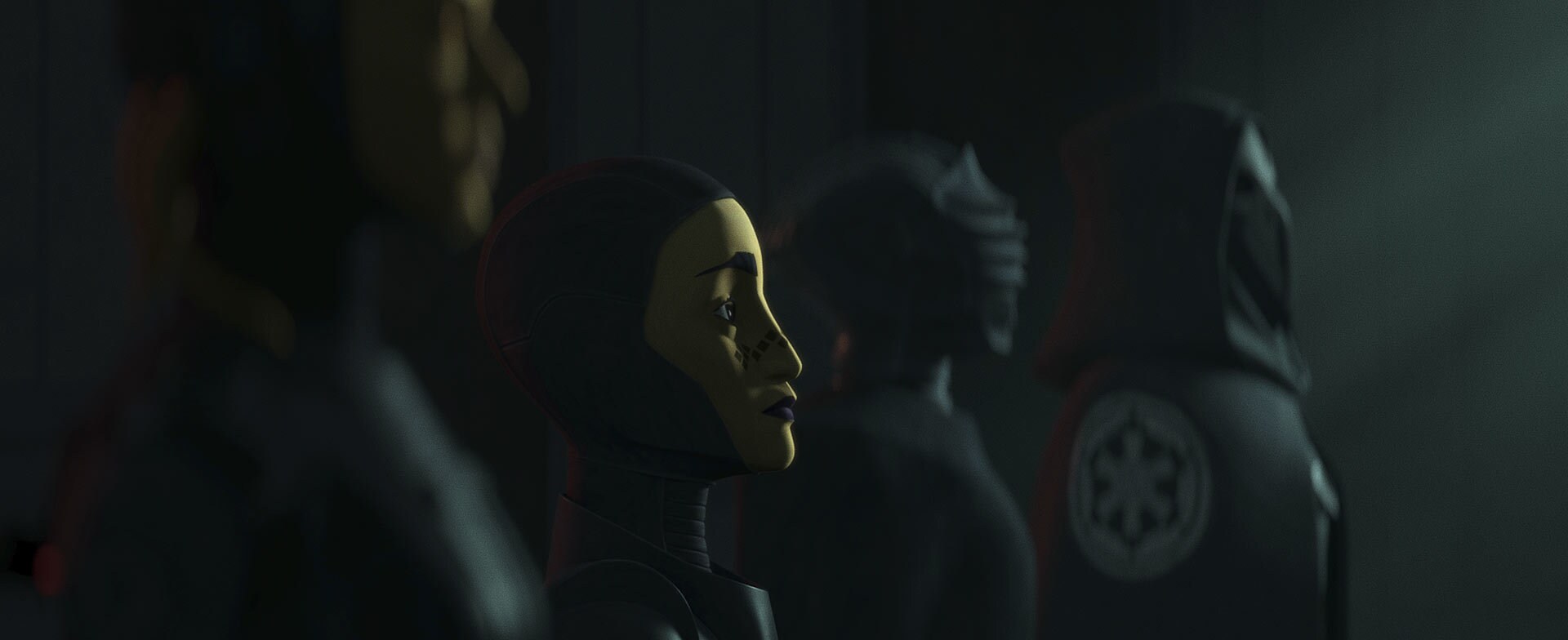
"Devoted"
From her prison cell on Coruscant, Barriss Offee watches as the Jedi Temple burns during Darth Vader's purge. Her guards tell her to be thankful she's not a Jedi anymore, but nothing else of what's happening. Some time later, Lyn Rakish, now the Fourth Sister of the Imperial Inquisitorius, approaches Barriss with an offer: become and Inquisitor, and get out of jail. Barriss accepts, joining a few other disaffected Jedi in training under the Grand Inquisitor. One of these Jedi, sensing the darkness of the Inquisitor mission, tries to leave, and is killed. Eventually, Barriss and another prospective Inquisitor are directed to duel to the death for their place in the Inquisitorius. Barriss initially resists fighting but kills the other initiate when cornered. Now a fully-fledged Inquisitor, she receives her armor and, along with several others, meets her new master, Darth Vader.
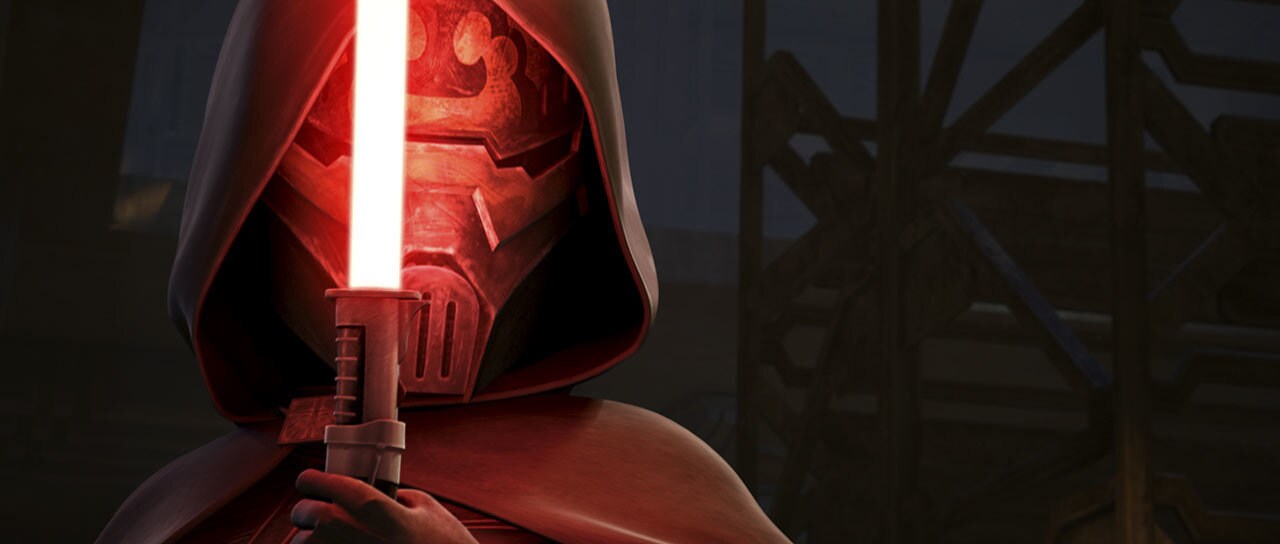
"Realization"
Barriss and the Fourth Sister are deployed to a mountainous world to find a fugitive Jedi. The people in the town there refuse to aid the Inquisitors, though Barriss is able to persuade a child to tell her where the Jedi is hiding; the Fourth Sister kills the town's people, sparing only the child, much to Barriss's horror. Barriss protests that Inquisitors are a force of order, not chaos; the Fourth Sister counters that order can only come when the Jedi and their allies are all destroyed.
They find their quarry in the mountains. Barriss is able to convince the exhausted fugitive Jedi to surrender, just before the Fourth Sister delivers a fatal blow. Barriss, realizing that killing is more than a means to an end to the Inquisitorius, Force-pushes the Fourth Sister off a cliff, then returns to comfort the mortally wounded Jedi with her healing arts.

"The Way Out"
Some time after the last episode, we find Barriss working as an itinerant healer. She advises the parents of a Force-sensitive child to hide from the Empire, sending them away on her ship as the Fourth Sister arrives in pursuit of the child. Barriss confronts the Inquisitor in an ice cave, confusing her pathfinding and causing her to doubt her loyalty to the Empire. Eventually the Fourth Sister impales Barriss on her lightsaber. Immediately remorseful, Lyn Rakish follows Barriss's guidance to find the way out, of the cave and of her dark life.
Analysis
Tales of the Empire is, at least in terms of structure, a significant improvement over Tales of the Jedi. Not only are both sets of three shorts kept together in sequence (an obvious convenience that Tales of the Jedi still somehow failed to provide), but the stories told are also a better fit for the format. Dooku's story was a bit too much to tell in ~40 minutes, and Ahsoka's story, at least up to the point we were shown, had already been told thoroughly. The origins of Morgan Elsbeth, and the story of what happened to Barriss Offee, by contrast, are both untold and able to be told across three shorts effectively.
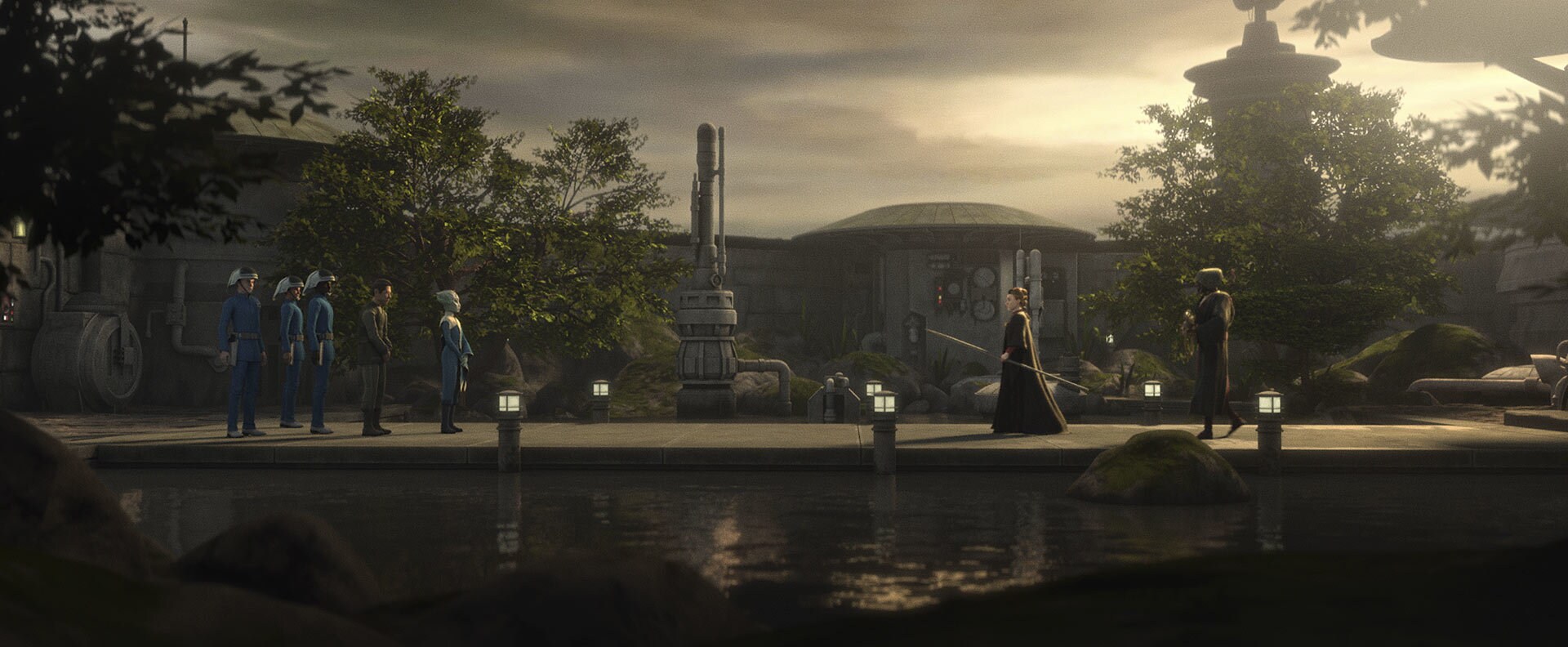
Of the two stories shown here, I enjoyed watching Barriss's story more than Elsbeth's. This mostly comes down to the fact that there's not much to Elsbeth's episodes that we didn't already know. From her appearances in The Mandalorian and Ahsoka, and from what was said of her, we already knew that she was a surviving Nightsister, that she was an industrialist building ships for the Empire, and that following the Empire's fall she brutally ruled Corvus from her fortress. And that's all we're really told in these shorts. Not just in terms of what the plot is, but also in terms of what she is. I don't feel like I understand Morgan Elsbeth as a characters any more that I did before. And I think it was a big missed opportunity not to show the Great Mothers contacting her from the other galaxy after Thrawn wakes them up; that's a bit of her life that we don't know much about, and seeing her realize both that Thrawn was still alive and that she isn't truly the last of her people would have been a more interesting third episode than the one we got, which just felt like scenes cut from her The Mandalorian episode.
Still, Elsbeth's shorts weren't bad; they had well-choreographed action scenes, and Inosanto's performance is well-realized in animation. Lars Mikkelsen's Thrawn steals his scene. The inclusion of what I took to be the Singing Mountain Clan from the original Dathomir tale, Dave Wolverton's The Courtship of Princess Leia, was something that stood out to me as setting up something for the future, moreso than just a nod to an influential Legends work. I imagine we might see them in the continuation of Thrawn's story post Ahsoka.
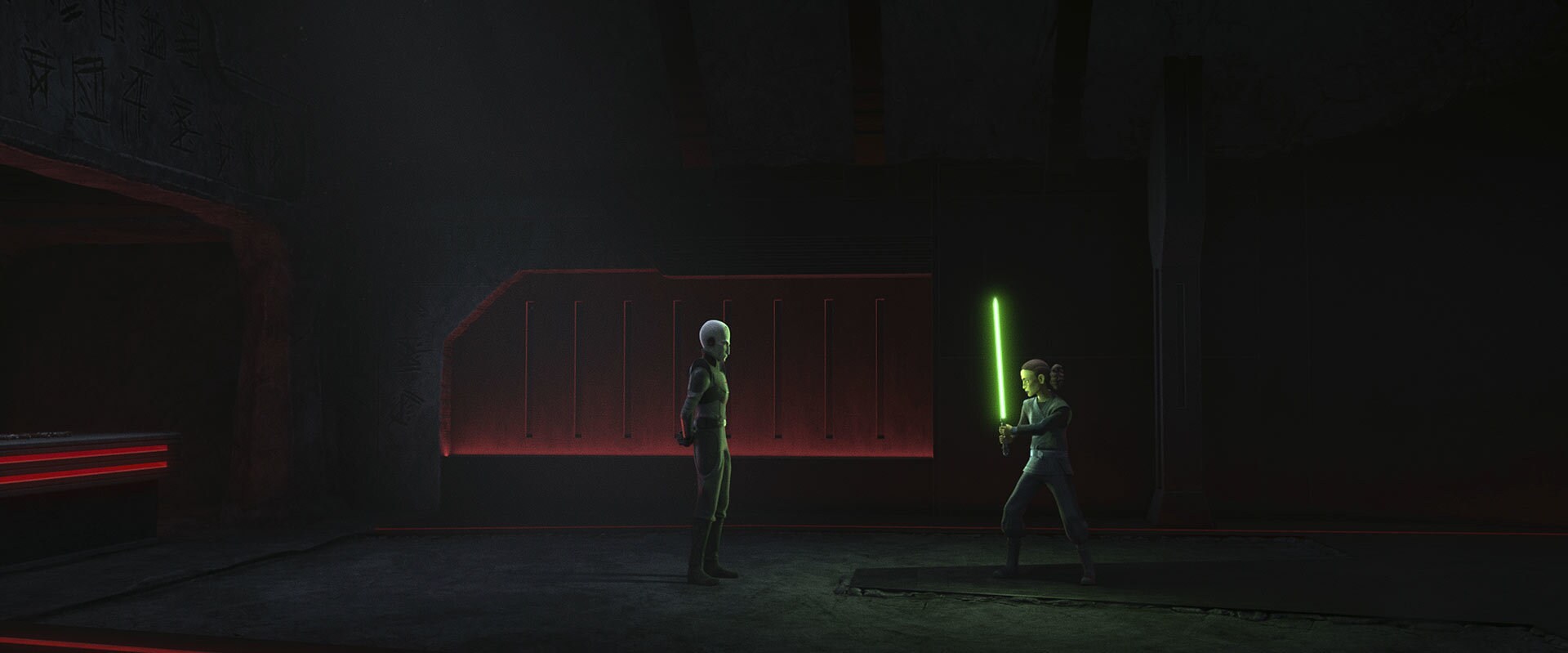
On to Barriss Offee's part of the series: this part was the story I was most worried about going in, because I knew it would be an Inquisitor story, and I didn't see Barriss as a particularly good fit as an Inquisitor.
Some background: Barriss Offee was created as a background character in Attack of the Clones, one of many Jedi shown fighting on Geonosis. But she was also featured more prominently in the lead-in novel The Approaching Storm, wherein she and her master were teamed up with Obi-Wan and Anakin and sent on that mission to Ansion mentioned at the beginning of the film. There Barriss is a bit of a counterpoint to Anakin, the model student in contrast to the rebel. From there she also appeared in the two MedStar books, which built on her role as a healer.
Then came The Clone Wars, with a very different take on the character. At the time, there was some attempt to merge the Clone Wars Barriss and the MedStar Barris, but with the Canon/Legends split made since then, I find it most useful to consider them different characters. Canon Barriss was introduced in Season 2 of The Clone Wars, in the episodes covering the second battle of Geonosis. Here she was the counterpart not to Anakin but to Ahsoka Tano. (Whether she was retconned to be closer to Ahsoka's age is actually still unclear. Officially she was still about Anakin's age, but she was very much portrayed as Ahsoka's peer. Wookieepedia does not have a year of birth listed for the Canon version of the character, while they list the Legends version as born in 40BBY.) Her role as a very dutiful, obedient padawan was retained, but her healing abilities were largely left out. Following the Geonosis arc, Barriss had a few sporadic appearances, mostly in the background of scenes at the Jedi Temple, before she came back into the story in the Season 5 finale.
Barriss's role in Ahsoka's expulsion from the Jedi Order was, I remember at the time, quite controversial. From her appearances in books Barriss already had a fanbase, who had been happy to see her in the Geonosis arc and who were eagerly waiting for her to be given a role in another story. Then, when that role finally came, it was as a last-minute twist villain. It felt like character assassination to me when it happened, and even moreso to MedStar fans. I hadn't read the MedStar books (and I actually still haven't–I should, now that I think about them) but just from what I did know of Barriss it seemed odd that she'd do what she did, bombing the Temple and then framing Ahsoka. It felt like something forced by the writers, who sacrificed Barriss's character to further Ahsoka's.
Filoni had probably meant to explore more of Barriss's story in The Clone Wars, but the Season 5 finale came a few months after Disney's acquisition of Lucasfilm, and the series was cancelled, with what episodes of Season 6 had already been completed being released as "The Lost Missions" on Netflix; Barriss did not feature in any of these, nor did she featured in the seventh season produced for Disney+.
While I didn't like how Barriss was handled in The Clone Wars, I also didn't care about her enough to stay particularly mad about it, and as Star Wars continued forward, I largely forgot about Barriss. Until I read Stories of Jedi and Sith, a short story anthology featuring, well, stories about Jedi and Sith characters from the films. One of these was Karen Strong's "A Jedi's Duty", which focused on Barriss and her conflicted thoughts about serving as a soldier in the Clone Wars (and re-introduced her role as a Jedi healer). That story recontextualized her betrayal of the Jedi, and going back to re-watch her episodes, I can kind of see what the writers were getting at. I still don't think they quite got there, but I can see how, if Barriss had been a more regular character in the show, and we'd seen her concerns that the Jedi had fallen to the Dark Side develop instead of having her blurt them out in her final appearances, they could have gotten there.
So there's the background to Barriss's story here. When I saw the trailer for the show, and saw Barriss was joining the Inquisitorius, I immediately hated the idea. Barriss Offee, who bombed the Jedi Temple to try to end the war so she didn't have to be a soldier, who was, at least in her own panicked mind, perhaps the first fighter for the Rebellion, was going to become an Imperial Inquisitor? Really? It wasn't even that I thought she was too good to be an Inquisitor; whatever you might say about her motivation in attacking the Temple, setting Ahsoka up to take the fall was inexcusable. But it just didn't seem plausible for her to take up lightsaber dueling for a living, unless she was seriously coerced.
Actually, coercion was a big thing I was worried about. It was mentioned in Inquisitor: Rise of the Red Blade that Iskat Akaris was the only Inquisitor to join willingly, the others having been subjected to Sith tortures to turn them to the Dark Side, as was first shown in Jedi: Fallen Order. I didn't mention this in my review of that book, but I really hate that idea in Star Wars. From what I can tell it goes back to Knights of the Old Republic, wherein Darth Malak captures the Jedi consular Bastilla Shan, ties her up, then blasts her with Force lightning until she turns evil and joins him as his apprentice. In both KOTOR and JFO, this serves as a cheap way to get a villain who can be turned back to the Light without having to give them a proper redemption arc. I don't like the notion that a fall to the Dark Side can be forced upon someone against their will. The entire point of Lucas's and most subsequent authors' works is that the Dark Side offers a quick, easy solution, at the cost of harm to others, of throwing the Force out-of-balance, and often of needing to rely on the Dark Side more and more to maintain what you desire over time. The temptation of the Dark Side must be faced and overcome by all Jedi, because it's something within them, not something external that's being pushed on them. Even if you could argue that Dark Side brainwashing is plausible in-lore, it doesn't work thematically in Star Wars, and it doesnt' make for a very interesting story besides. (Hence why the in-depth look at an Inquisitor we got was about one who wasn't tortured.)
Barriss isn't brainwashed. (This doesn't break lore with Iskat; Barriss seems to be part of a later class of Inquisitor recruits, given that she is taken from prison to the Fortress Inquisitorius on Nur, while Iskat and her comrades operated out of the Imperial Palace on Coruscant.) She's lied to, yes, but her role as an Inquisitor isn't forced upon her directly; instead, she's offered her freedom and a place among like-minded people, and a new duty. Barriss's core flaw throughout her life is a lack of independent morality. As a Jedi she was focused on doing what is asked of her, not seriously considering the right or wrong of her duties. Her goal was to be a valued member of the Jedi Order, which was what she took for granted to be the same as being a good person. When that confidence in the Order failed, so did Barriss's moral compass, it seemed. If the Jedi were good, then anything Barriss did for them could be justified, but if they were bad, then anything Barriss did to them could similarly be justified. When she's offered a role as an Inquisitor, she goes through the same process – more quickly this time – only after a second disappointment she gets away and has to find her own way in the Galaxy, without team allegiance dictating her course of action.
One other thing I noted that spoke to Barriss's character: her signature move through this series is to Force-push people away. She does this to the Grand Inquisitor, then to throw Lyn Rakish off a cliff. This isn't a careful, deliberate attack, it's a sudden outburst. It's impersonal as well, as much a way to reject a fight as to end it. That's a subtle thing, so subtle it might not even be intentional, but if it was, I appreciated it.
So, Barriss was actually quite well-characterized here, but how was her story as a whole? The first episode is quite good. You understand how Barriss gets mixed up with the Inquisitors in order to get out of prison, but you also understand how she could come to accept a role with them regardless. They tell Barriss that she was right all along. I found it interesting how the Grand Inquisitor describes the Inquisitorius to the new recruits as a successor order to the Jedi, not simply as the enemies of the Jedi. This, I suspect, gives Barriss hope that once the remaining Jedi are dealt with, that she might be able to shift to some sort of a peacetime role. As when she was a Jedi, she just has to wait out the conflict.
The end of the first short features a voiceless cameo from Darth Vader, which feels pretty pointless considering that he doesn't otherwise appear in the show, despite his and Barriss's personal histories; more about that in a bit.
The second episode, the aptly-named "Realization", shows Barriss coming to terms with the fact that the Inquisitorius is actually much worse than the Jedi, in that they are darksiders without apology. They are not truly th agents for peace and order that they presented themselves as; they are vengeful killers who rule through fear and aggression. I guess they concealed this for a while; probably Vader knew that Barriss would balk if they went too fast. For all her faults, that's not what Barriss is.
Barriss being redeemed in this story seemed so obvious to me going in that it's hard to consider that she might have just stayed an Inquisitor, but I suppose that is what the trailer was getting at. Again, I think that Strong's story was quite front-of-mind for me as I watched this show; if, like many viewers, I hadn't read that, I might have been more surprised by the direction that "Realization" takes. I think that Barriss is an interesting case in Star Wars, someone who poses the question of what difference there is, if any, between a Jedi doing wrong and a Jedi falling to the Dark Side. At first glance, there isn't really a difference. But I think here we can see there is: one who has fallen to the Dark Side has, in every case I can think for, done so out of possessiveness, either seeking to have something they don't have or to keep something they do have but might lose, or else out of vengeance. Barriss I don't think fits this pattern. Everything she does wrong is because she became convinced that the Jedi had become the driving force in the suffering of the war, and while that wasn't true, that's an attitude of selflessness underpinning Barriss's wrongdoing. So I don't think she really fell to the Dark Side or anything as grand as that; I think she was a much more mundane sort of villain.
The third episode is where things sort of fall apart for me. I didn't really follow what all was going on in that cave. Like, I get what happens; I'm able to follow the events; but I don't know what the titular "way out" was supposed to be. I felt like this did what The Last Jedi did in making an allusion to the cave on Dagobah in The Empire Strikes Back without actually getting a proper scene out of it. Part of it is that Lyn Rakish isn't as developed a character for me to fully understand what she's going through. In broad strokes I liked this third short, but in examining the details I come up rather confounded, and I don't think that's entirely my fault; I think it's confoundingly told.
And, now that it's been a bit: while it's fitting to have Lyn Rakish here, since she was in the other two, but I really was expecting Vader to come after Barriss. Not just because he was responsible for the Inquisitors, including for hunting down deserters, but because Barriss owes some people she owes apologies, and one of those is Anakin Skywalker. I think her apologizing to Vader for what she did to Ahsoka would have planted an interesting seed in Vader.
I have my guess why they didn't do this, though: if Vader came after Barriss she would have died. With Lyn she seems to die, but it's ambiguous. It could be that there's stories yet for Barriss Offee, that she had to be spared to star in. We know Ahsoka's story still has some to be told; maybe Barriss will feature in that? We'll just have to see. Hopefully we won't have to wait another eleven years.
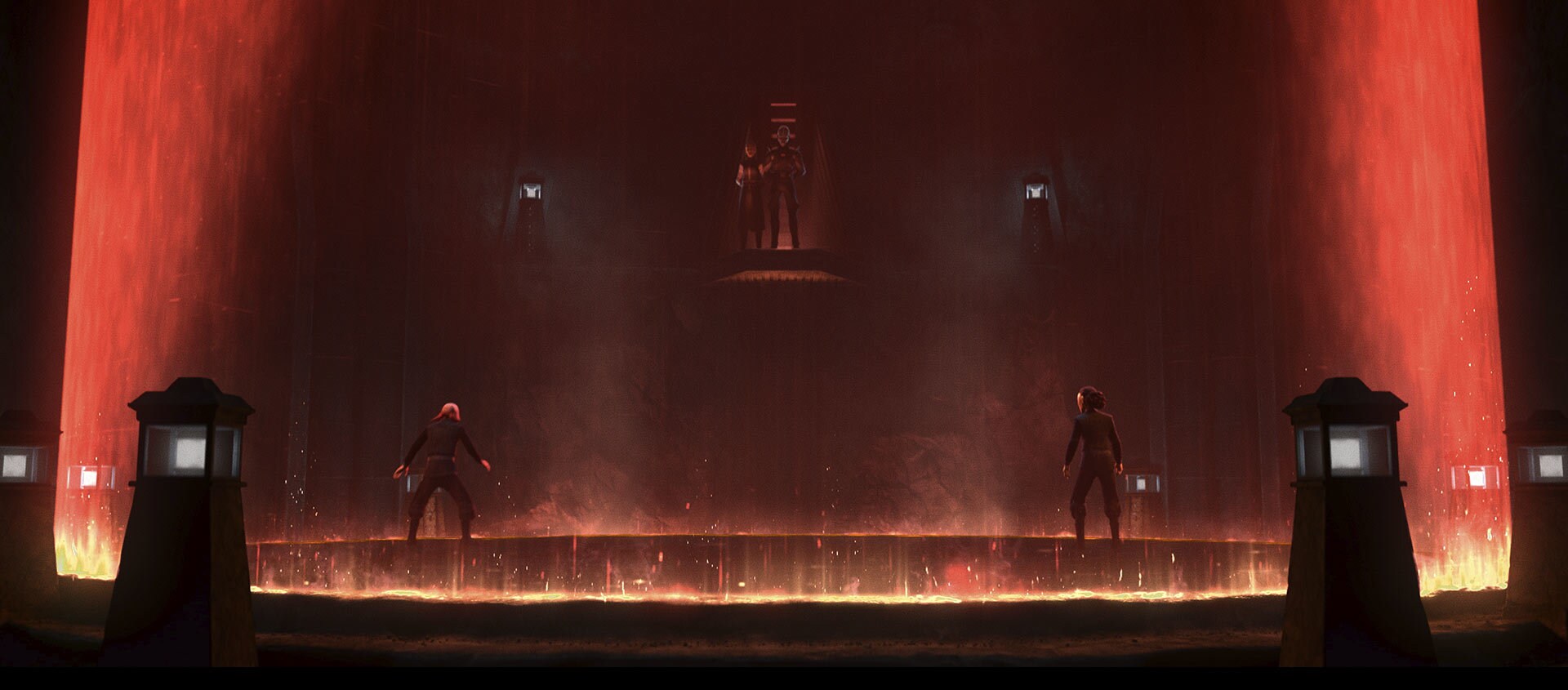
Recommendation & Rating
I called Tales of the Jedi "catalog filler"; not bad, but more something to fill out Disney+'s list of Star Wars offerings than something really driving the franchise forward. Tales of the Empire, I'd say, is the same thing, except that the final three stories really were the continuation of the story of Barriss Offee, who's been a loose thread in Star Wars for a decade; they aren't just extra scenes of her or an exploration of her backstory. The first three shorts are okay, but much less essential. Both arcs suffer from their third short being the weakest.
If you are a Barriss Offee fan who hasn't seen her part of this, you should watch it. Otherwise, I think most viewers would be content with what they get from watching Tales of the Empire; moreso than in Tales of the Jedi, the stories told here match their running time, with neither too much being tackled nor too little being told. Seeing as it is a notable improvement over the last animated set of "Tales", I give this
7
/10 — With some measurable negative worth, but overall a positive experience. Above average and able to be sincerely recommended.



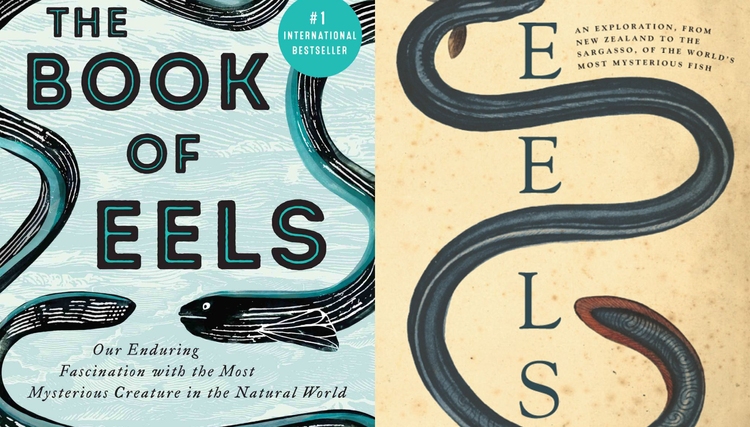
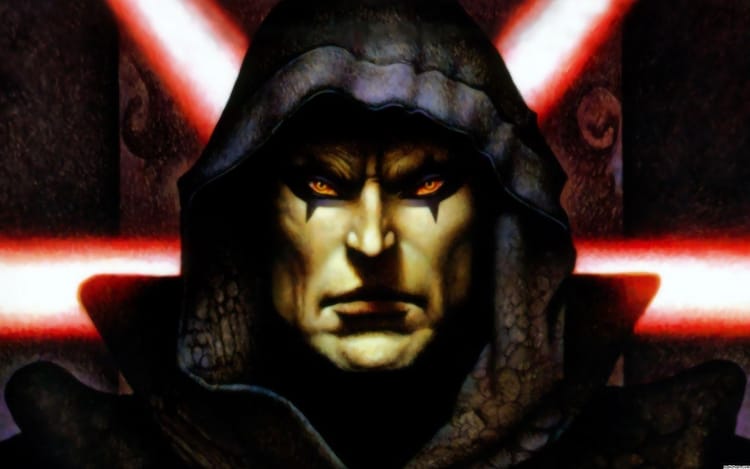
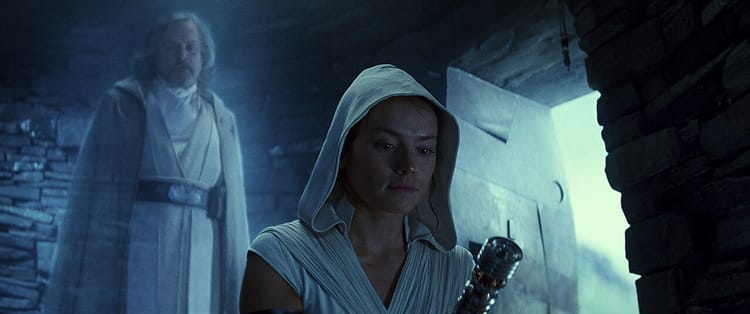
Member Commentary